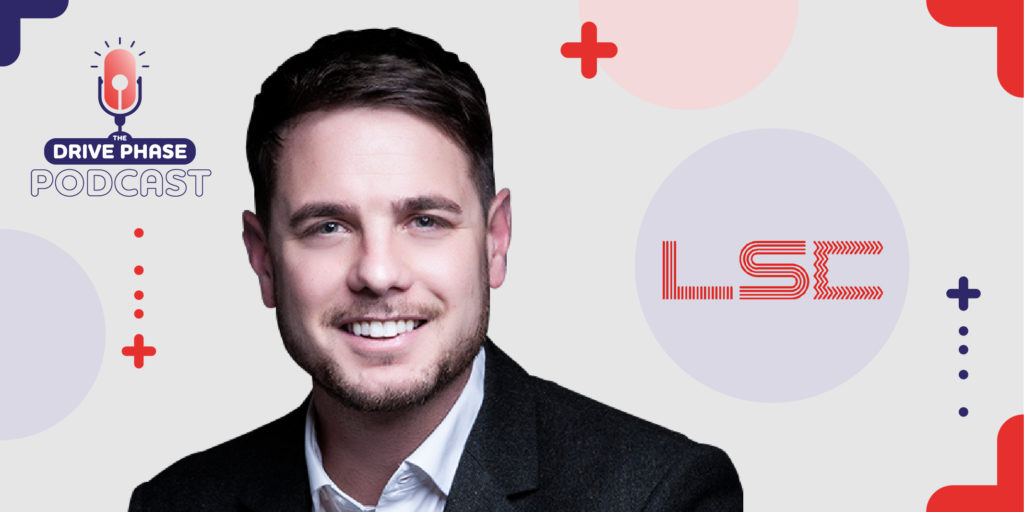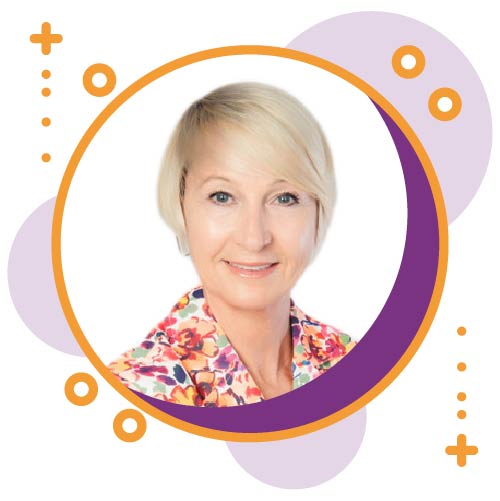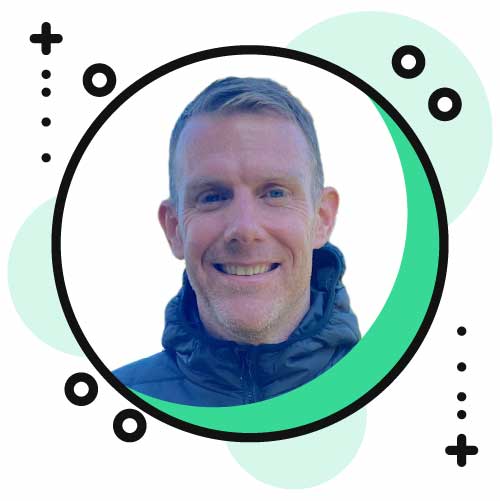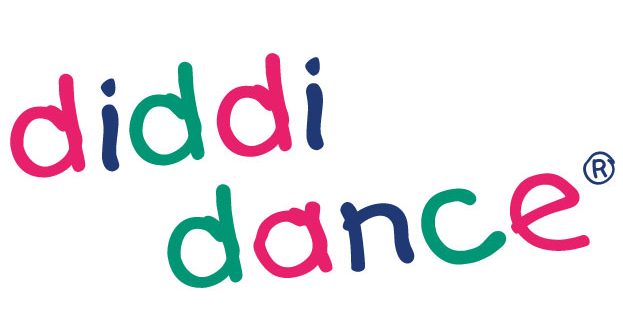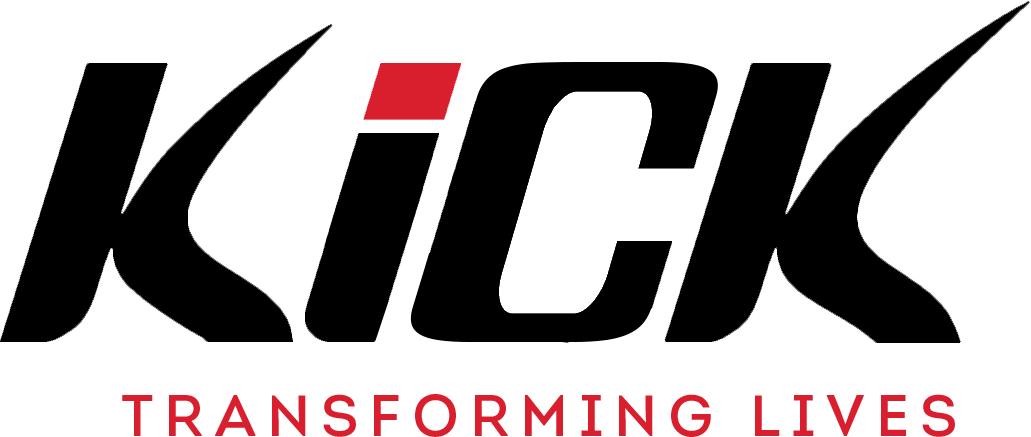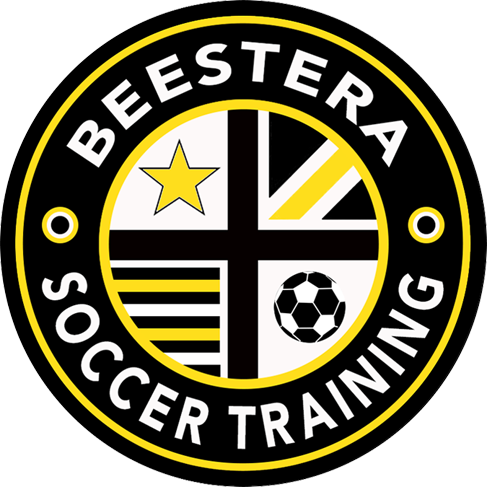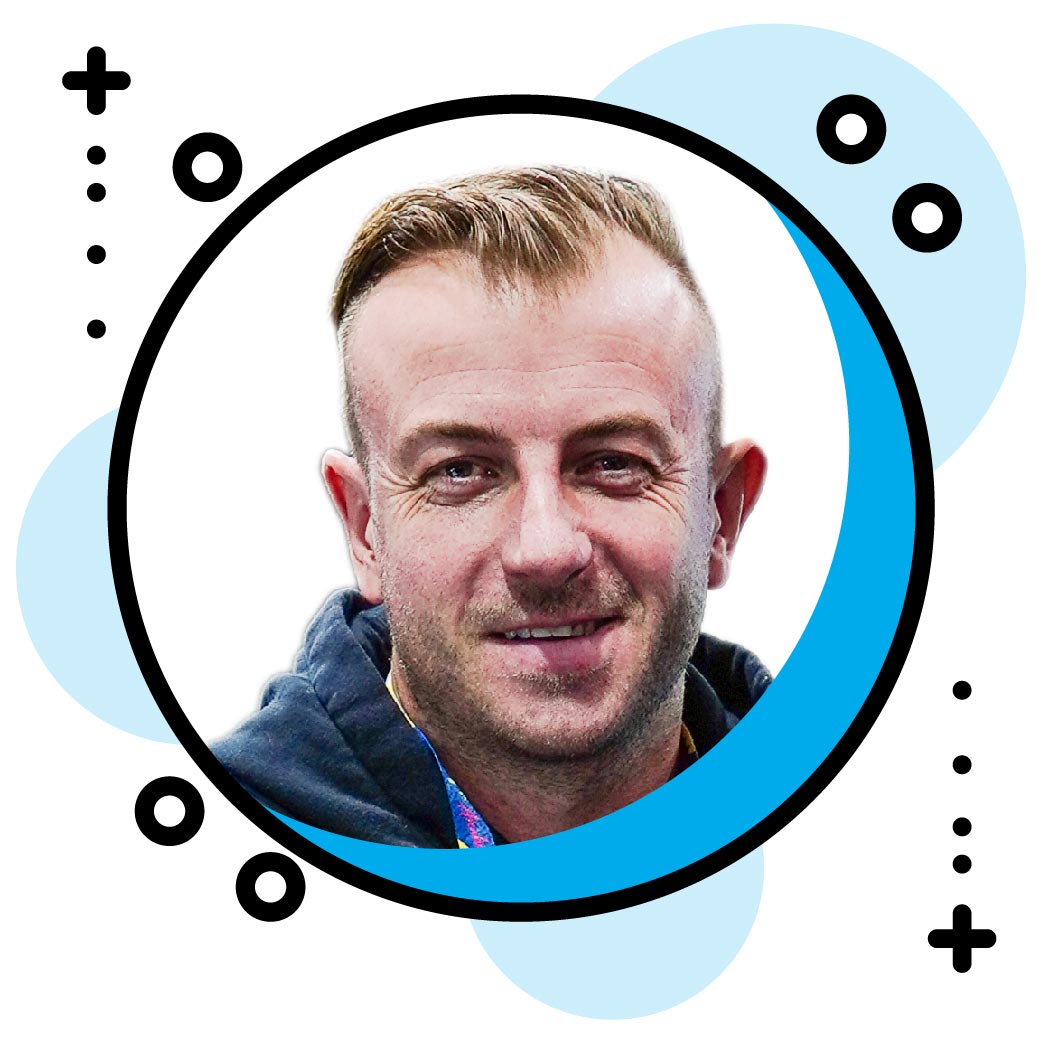Craig Brennan 0:00
As you grow as a business and as you become more successful, more opportunity naturally presents itself. People asking you, would you be interested in this? Or what about this? It’s very easy to try and do a little bit of everything. So for me, I’d say focus on what you think will have the most value. Focus on that as far as you can.
James Moore 0:23
From Coordinate Sport, it’s the Drive Phase, a show about sports founders, leaders and experts, and the stories behind their business journeys. Our guest on this week’s episode is Craig Brennan. Craig is a true sports entrepreneur, being a founder and owner of multiple businesses in the sector. His stand out venture is at Little Sports Coaching, launched in 2006 to deliver preschool football classes in Manchester. The company now works with 150 schools and 20,000 children per week. Craig walks us through his journey of how he grew the business and how this opened up further opportunities to expand his business portfolio. This leading eventually to becoming chairman of his hometown football club, Cheadle FC. We hear Craig’s take on the importance of focus, how the industry has developed, and the myths that are holding it back. So grab a coffee, sit back, and enjoy hearing from an industry entrepreneur in the midst of rapid expansion.
Hi Craig, great to have you on today. Where I want to start is right back at the beginning. So in my notes it says born and raised in Manchester, or was it Stockport, which one would you say?
Craig Brennan 1:37
Born in Manchester, raised in Stockport, so a bit of both.
James Moore 1:41
So do you want to pick up the story from there, looking at school life and then how you came up with your business?
Craig Brennan 1:47
Absolutely. So I went to a state school. It was a Catholic school run by nuns when I first went there, so it was quite strict. I wasn’t the smartest, but I wasn’t at the bottom of the class either. I’d say I was halfway through. I was a bit of a joker, enjoyed laughing and joking with friends, and was big on sports. I played a lot of football, some athletics, badminton, cricket. So I had a go at quite a lot of sports when I was young, but probably football was the one I excelled in most.
James Moore 2:15
Were you a sporty family would you say?
Craig Brennan 2:18
No, funnily enough. My dad will tell you he’s a good footballer, but he wasn’t from what the rest of the family tells me. So not really, no. I fell into football through my uncle actually who was managing a local football team. So it wasn’t a sporty family as such. I moved into football more as an elite sport as I got a little older, but I generally did quite a few sports when I was in primary school and then focused on football as I got into high school.
James Moore 2:46
Do you think that had given you a good grounding in terms of not just focusing on one sport? Many kids nowadays will go directly into one sport and focus on that from a really early age. What do you think about maybe giving them a bit more grounding? I know you did loads of things like I have fishing and BMX written down here as well.
Craig Brennan 3:01
Yeah, I tried my hand at everything. But absolutely, I’ve got a little girl now, and one thing I’ve encouraged her to do is try lots of different sports and not be pigeonholed early on. So I think you should try and find sports that are cross-disciplined such as gymnastics and athletics, that will be valuable as you grow up anyway. So that’s something I think I benefited from, that diverse range of sports at a young age.
James Moore 3:26
Yeah, the transferable skills. I’m sorry, I stopped you in your story, so you started getting into elite-level football?
Craig Brennan 3:33
Yeah, I wouldn’t say elite, but I had a higher standard when I was younger. I played for my local interleague back then. So it was the best players from the league joined at interleague, and I played in that team for under 12-13s. Then I went to a few different clubs trials and was at Manchester United for a while. I never got any further than that, and then at 16, I got into amateur and non-league football. So I never went down the full-time route. It was all part-time and non-league since I left school.
James Moore 4:06
You mentioned you have kids yourself. Was that a struggle during lockdown, looking after a little one?
Craig Brennan 4:11
It was, but I’m very lucky to have my wife. She works three days a week, and I work a lot. So it’s good that she was trying to do the majority of the work if you can call it that when it comes to looking after a little one. It was a struggle, but it also makes you realise what you’re doing it for as well. Lockdown was a big eye-opener for me of how much time I should be spending with my family, as opposed to working. So it was difficult, but it was an eye-opener.
James Moore 4:42
So through school, middle of the road, you’d say in academics. Do you reckon you’ve always been destined to be an entrepreneur, start your own business? Is that something you’ve had mapped out from a young age?
Craig Brennan 4:55
No, it’s not something I thought of if I’m honest. I can’t remember thinking about what I wanted to do when I was older when I was at school. But then family members and friends who I grew up with tell me that I was often buying sweets from the ice cream man and trying to sell them at a higher price. So I guess that entrepreneurial spirit was always there, but I never really knew what it was. My mum’s actually got a home video of me filling a wheelbarrow full of footballs and knocking on for all the kids down the street, trying to teach them how to play, which was weird because she only told me that once I started my own business.
James Moore 5:27
So you’re saying that your mum had found an old home video of the early days of your coaching career?
Craig Brennan 5:32
Yeah, I think I was five or six. I filled the wheelbarrow with footballs, and a football pump, some rocks and whatever. Then apparently, I’d knock on for the children and try and get a football session going. I was teaching them all how to play football, so that was interesting. My mom never told me that until I was 22-23 after I started my business.
James Moore 5:50
It would be a good one to stick on the website as an origin story. So through school, non-league football. Did you go to College or University, maybe down the sports coaching or sports science route?
Craig Brennan 6:04
I did, and I didn’t. When I left school, I wasn’t sure what I was going to do. I was originally going to try out for the Marines or the Navy and go down that route. Then I found a course which many people are doing now, which was a BTEC in football. It was blended learning but practical football training as well. At that time, there was no one else really offering that. So I saw that and applied for it, and I got on the course. At the same time, I had just started a part-time coaching job with a local organisation. So I started the college course, and then after about three months, I ended up dropping out because I realised that I’d get the same qualification if I just went direct with the FA.
James Moore 6:43
So you went through to college, and you enrolled on the Football Excellence Program, which was a new program at the time. Is that right?
Craig Brennan 6:51
That’s right, yeah. It was at Cheadle College in Stockport, and there wasn’t really anyone else doing that at the time. There were probably about 100 students on the program. It was blended learning, half education and half practical football. So it was an opportunity to continue playing football which I obviously jumped at.
James Moore 7:09
Was that when you started your coaching career? Was there a coaching badge mixed in with the course?
Craig Brennan 7:15
Yeah, so it was a BTEC level two in football coaching, which I think was a one year course. I’d already started coaching for a local football coaching company part-time whilst I was at college. So as I started looking into qualifications with the FA, I realised that I could get my level two within a week by going direct with the FA, and I didn’t have to waste a year at college the way I saw it. I could go straight into coaching full time whilst doing my qualification.
James Moore 7:42
Yeah, well, it sounds like a no brainer to just finish it in a week and start earning straight away. So what made you make that decision to think I’m going to start my own business? Because that’s a big leap for a lot of people. Not many people started their own businesses back then, although it’s a lot more popular now to be an entrepreneur, etc.
Craig Brennan 8:03
I worked part-time for a local organisation, and then I went to work for another coaching company. When I joined, I was 20 years old, and I was effectively managing his business for him. I was doing all the invoicing, organising the office, scheduling staff in, generating new leads for schools, organising sessions, booking venues. So 20 years old, pretty much doing everything. I wouldn’t say the owner was non-existent in the business, although I probably saw it like that at the time. Being an owner myself now, I know there’s a lot that goes on behind the scenes. But I did feel I was offering a lot, and I was getting paid very little even for back then. So I approached him, and I said I’d like to take a more senior role. Have more of an impact on the business. And obviously, I think I deserve a better pay packet for that. But he didn’t agree. I was only working Monday to Friday for this organisation, and at that point, I had the idea of offering some football sessions locally for children under five. Which is a big thing now, but back then, in 2004-2005, there wasn’t a massive market for it. So I set up my own business on a Saturday, which wouldn’t conflict with the existing business. That grew really well, but then the owner of the business I was working for didn’t like that I was doing both of those things. My own thing was going really well, so I decided to leave and take my business full time. But it wasn’t something that I ever really thought about doing until that point if I’m honest.
James Moore 9:27
Yeah, but you never looked back from that point on, I guess?
Craig Brennan 9:30
No, there’s been some dark days. I’m sure you’ll agree in business there are always dark days. But I think being your own boss and managing your own businesses, until you’ve done it you don’t realise how much fun it is.
James Moore 9:41
Yeah definitely, not many 20-year-olds are doing the invoicing and credit control. Even seeing that side of the business, to just be out coaching and enjoying the job.
Craig Brennan 9:52
Whether I was doing it right is a different story, but I thought I was doing okay. You just make it as you go along at that age.
James Moore 9:59
So 2006, you start the Saturday morning stuff, and was that Little Sports?
Craig Brennan 10:04
It was called Little Kix Coaching back then, and it was purely pre-school football classes, Saturday mornings, parents involved. We now have a program called Tots FC, which we’ve now turned into a program as opposed to the whole business. But we then changed the name from Little Kix to Little Sports Coaching in 2008 for a couple of reasons.
James Moore 10:26
So from 2006 to 2020, you’ve gone from that one Saturday morning class to over 100 coaches at the moment, right?
Craig Brennan 10:36
I think the last time I checked our HR system, 120 people on it, so yeah.
James Moore 10:41
So 120, over 150 schools. Probably more than that now since the last time we checked on the numbers. Without trying to bottle it all up into a couple of minutes, what was that like in terms of growth? When you first started, did you have the vision to get to where you are now or was that something that’s just evolved as you’ve gone along?
Craig Brennan 11:00
I think I’ve always had a vision. After the first year of running the business, I started to think what are the capabilities of the business and how far can I actually take it? I had maps up in my bedroom at my parents’ house, which was also my office, and I had pinned on where I planned to open. But that was purely based on aspirations. We wanted to be a nationwide business. What that would look like, I had no idea. It was just that I wanted to take this business nationwide. But I think I’ve always had big aspirations. There was a lot of stuff that I aimed to do that I failed. But I think if you don’t have those big aspirations, then you’re not really pushing yourself far enough anyway. So I did want the business to grow, but how big and what that would look like, I wasn’t so sure.
James Moore 11:49
Can you think back to a moment or milestone when you thought, I’ve definitely got something that can be a lot bigger than just, no disrespect for just Saturday morning sessions, but for what you’ve developed now? Was there a moment in time when you realised it was going to be something big?
Craig Brennan 12:11
No, I think it’s more of the people telling me rather than me identifying that myself. So when the accountant gets to a certain size of turnover on profit, she starts to have different conversations with you, like this is a real business now, it’s not a lifestyle business. Those conversations start to change, and then your network starts to grow. When instead of speaking to managers of businesses, you’re talking to Chief Execs and MDs. Then you start understanding and hearing their stories, and your aspiration starts to grow as well. When I set up at 21, I was still obviously very wet behind the ears and wasn’t taken seriously for quite a few years, which I completely understand. It wasn’t until I got to 25-26, and the business was doing quite well that I thought this is something that I can scale and make a serious business. So I don’t think there was one time where I can remember it being a milestone. It was more lots of little occasions, where people started to tell me that we’ve got a good business.
James Moore 13:09
Yeah, and to build up such a large operation, I’m assuming you’ve had to build a really strong team underneath you. How has that gone? Have you promoted from within, or have you brought people in with the expertise that you’ve required? Because I know with most companies in the industry, most people start off coaching and then work their way up. And that could be as a business owner or just the operations teams.
Craig Brennan 13:30
It’s been a bit of both. I believe any business can only be as good as the people. I think we’ve had a mix of promoting from within the business, and also bringing staff from outside. I identified quite early on that there are many things I wasn’t good at, and I needed to bring people in around me who were better than me at those things. I needed to effectively let them do their job and tell me what we need to be doing, as opposed to me telling them what I think should happen, so there’s been a bit of both. There have been times where it’s worth promoting within, and there have been times where I’ve probably promoted from within when I shouldn’t have done. More because I felt like I had allegiances with that person or those people because they’ve been with me for a long time, and I thought they deserved that step up when they probably weren’t ready. I always take full responsibility for that. And if I do put someone in a position where they’re not performing, or they’re not achieving the objectives that we’ve agreed on, then I’ll try and put them into a position that I think suits them as opposed to moving them out of business. Then on the flip side, there’s been times where I’ve brought on people from outside the business who have not necessarily got the industry experience. So they are really good operationally, but they don’t quite get sport or primary school PE. So it’s a bit of both. The biggest struggle I’ve probably had in the last five years is building that senior management team and getting it to the level where we’re ready to grow. But I think we’re there now.
James Moore 14:59
What are the aspirations for the business now moving forward? Obviously some big challenges at the moment across the industry, but hopefully, after this has passed, what’s the driver for you into the next three to five years?
Craig Brennan 15:14
The strategy for our organisation for the next three to five years is growth through acquisition ideally. We’ve dipped our toes in franchising. We’ve launched three Greenfield sites, so effectively going into regions or cities where we’ve got no coverage or exposure at all. I would be starting from scratch. It’s worked, but it’s slow. So our strategy now for the next five years is going to be acquisitions.
James Moore 15:40
I’ve had some interesting conversations with a few other guests around franchising. Whether to do it or whether not to do it. Some have been super successful with franchising, and others have maybe chosen not to do it or had a go and thought that’s not for us. What’s your take on on the franchising model?
Craig Brennan 16:00
For me, it’s obviously a vehicle for growth. It’s a model of distributing your business. We tried it, and I just think it limits you on quality. You’ve got to manage the quality a lot, and I found that many franchises or businesses I’ve come across are only as good as the best franchise or the worst franchise. So you could have a franchise up north that could be absolutely incredible, and then a franchise down south that’s not doing very good. Yeah, they own a region or a territory that could be turning over £1 million, but they’re quite happy turning over 300k because it’s a lifestyle business. So you’ve got 700k worth of potential market that you’re losing out on because that franchisee in that area isn’t maximising it, if that makes sense?
James Moore 16:40
So not just the quality of delivery and that control of keeping in charge of your product, but also that quality of performance? Like you said, being able to drive people who might not be as ambitious as yourself to take on the full opportunity.
Craig Brennan 16:55
Absolutely yeah, ultimately it came down to quality for me. I know there are ways you can manage and assess the quality of your franchisees as a franchisor. But I felt at the time that we’d have much better control over the organisation, on the quality of not just the delivery, but the standards of staff in how we recruit staff. With people being core to our business, we felt that we were to have full control over who we brought into the business, which I don’t feel you’d have as much control as a franchise. Although you might think you do, the visibility probably isn’t where we’d like it to be. So like I said, we did start, but we got burned. The person who took on the franchise decided to set up on his own under a different brand. They effectively took our operations manual, took all our know-how, and ran. We had a franchise agreement this thick so we could’ve pursued it, but we decided not to. He was actually a friend of mine at the time, I still speak to him funnily enough, and I take learning from it ultimately. I don’t tend to get angry with things like that. I just take the learning out of every situation and apply it to how I’m going to operate in the future. So for me, that just confirmed that franchising isn’t the way for me personally. I’m not saying it’s not right for everyone, it just wasn’t right for me at the time.
James Moore 18:14
I’m sure that that experience of franchising probably pushed your buttons, but I’ve got another question around that. What’s one of the common myths about the industry, the sports coaching sector as a whole, maybe the stereotypes you hear?
Craig Brennan 18:33
I think there’s a lot of Chinese whispers amongst competitors, as people would call them. One thing I was very aware of early on, and it’s started to change now, is that there are many people out there doing what we do. It’s become a crowded market now, and there used to be lots of Chinese whispers and people talking about each other in certain ways, without actually knowing what’s going on. I think there’s enough work for everyone to go around, and if the industry came together and was more collaborative, it would be better for everyone ultimately. I think there were many providers out there who would say negative things about one organisation. But then I think people started to speak to lots of other business owners in the sector, such as yourself, and there’s plenty of people around the country that I’ve spoken to. We’re all like-minded. We all understand the sector. I’d like to think I get on really well with everyone, but I think originally, it was very divided. You didn’t really speak to your so-called competitors or the other organisations down the road. They were the enemy kind of thing, and that’s starting to go away a little bit now. People are collaborating a little bit more and working together, which I think’s fantastic.
James Moore 18:51
Yeah totally agree on that. I think also, it’s maybe a bit of an immature market, and the owners are young as well. So with age, and with the age of the market, people come to realise that the market’s big enough for everyone to run a successful business. You’re going to compete, but you don’t need to be as paranoid. Everything’s not a conflict. So with that being where we are now, in terms of the industry, what changes did you see from when you started to now? Let’s say you were looking at creating a business now, and the listeners we’ve got listening to the show who are maybe not as far into the journey of growing and scaling a business. How do you see it for them starting now? What do you reckon are the differences from when you started to now?
Craig Brennan 20:26
I’d say the difference now is the level of professionalism. There used to be a lot of ‘white van men’. There used to be lots of small organisations with a white van, bag of footballs, cones and markers in the back, and they’d go from school to school, session to session. A couple of part-time coaches potentially. So I think the level of professionalism has definitely improved, which can only benefit everybody, people who deliver to families, schools, and the businesses themselves. I think there’s a big benefit. I’d also say people have started to have more of a USP. Coaching companies used to be all quite similar, offering similar things. But now, with the introduction of technologies, different branding, and different kinds of activities that are on offer, you’re starting to see some USP’s coming to the market. Which is separating some people from potential new businesses that aren’t very experienced, or people are just doing delivery based things. So I’d say the level of professionalism has improved, and the USP’s for many organisations are starting to stand out.
James Moore 20:26
Yeah definitely. That’s touched on my next question, but how do you stand out in that crowded market? Like having a USP is key, but have you got any marketing tips for people who are just staring out? What could they do for marketing their businesses better?
Craig Brennan 21:50
Well, I’d say it depends who you’re marketing to, whether you’re going to parents for your out of school sessions or directly into schools. As you know, marketing and selling to schools is notoriously difficult. You’ve got to get past the gatekeeper. So I think number one is having that USP, something that sets you apart from the competition. I think number two is quality. If schools and customers see you’re good and that you’re consistently good, schools will sell themselves. It was only last year that we introduced a sales and marketing function to sell directly to schools, and we’re coming up to 15 years old. Without that, all our work has come through word of mouth. So you do a good job with one school. You look after them, and you have high-quality, consistent staff that are professional. Then they’re going to tell other schools, and we grew that way. So, having a USP and doing a good job. Also, making sure that whilst you grow, you ensure the quality is still there, and you don’t dilute that quality. That is if you want to go down that route because not everyone’s happy to grow. And I’ll hold my hands up. That’s something we did as we grew because we grew so quickly that we didn’t have a quality assurance team in place. The quality of the coaches that we had probably wasn’t where it needed to be. They weren’t being supported and upscaled as much as they should have been. So we fixed that quite quickly, but looking back, I’d rather have grown slower and kept that high level of quality. It’s just about making that decision. Do you want it to be a lifestyle business and have high quality all the time, or do you want it to be a big business? And if that is the case, then you have to set up to grow. Have that quality assurance team and these key metrics in place to identify where you’re weak and where you’re strong.
James Moore 23:39
Going back to company setup and things like that, you’ve got Little Sports Coaching, but that’s just one of the elements to the Little Sports Group?
Craig Brennan 23:48
That’s right.
James Moore 23:49
Can you run us through the rest of them because it sounds like you’re really busy? Is it five or six companies in there?
Craig Brennan 23:55
Six, yeah. We’ve got the Little Sports Group, which is effectively the holding company. Then we have Little Sports Coaching, which is separated by region, with each being a separate business. So, we have LSC Manchester, LSC Liverpool, LSC Leeds, and they’re all separate organisations. We then have a junior football club called FC Sports, and we also have a non-league football club called Cheadle Town, based in Stockport. Then we have a company called Coach Out, which is a web platform. Effectively it’s Uber for sports coaches. So if you’re looking for a private coach, for example, football, golf, tennis, you can go on our platform and type in your postcode, what activity you want, and then you can book them through that. So it’s one-to-one coaching.
James Moore 24:42
Right fantastic, and is that nationwide that Coach Out?
Craig Brennan 24:46
Coach Out is nationwide effectively, but most of the coaches on there at the minute are northwest based.
James Moore 24:51
What we’ll do is we can add that in the show notes, so if anyone listening is interested in getting involved signing up as a coach or as a participant, they can find that there.
Craig Brennan 25:00
Yeah, it can be pretty difficult for coaches, so we give them a platform to advertise what their skill sets are. Then people can book them based on where they are and what you can coach.
James Moore 25:12
As you went through the businesses there, you mentioned Cheadle Town. That seems like a huge achievement. Did you buy the club, or have you taken it over? It’s an existing club that’s been there for years, I’m assuming, and you’ve kind of stepped in?
Craig Brennan 25:26
The club was founded in 1961, and then it was rebranded in 1978 as Cheadle Town, so it’s an existing club. I played for the club when I was 21 years old, and then that uncle, who I spoke about earlier that introduced me to junior football, also played for the club, and so did his sons. He’s sadly passed away now. But the club was having financial difficulty a few years ago, and we were looking for a club where our under 18’s could move into. We’ve got a junior section football club, and many of our players would leave football at 16, 17, 18 and not get back into it again, which is a massive problem. It’s something that nearly happened to me. We were keen to have that pathway into the non-league club. At first, we were just talking about partnerships, and then it became apparent that they were financially struggling. So I sponsored the club through LSC, and we paid for an electrical fit-out and some other things for the club. They just didn’t seem to be able to generate money themselves, so over a couple of years, we negotiated to take over the club, and we eventually bought the club in 2018. The long term plan for the club is to be in the National League. It’s effectively going to become our head office for LSC, or the Little Sports Group, and have sports facilities on-site as well.
James Moore 26:39
Sounds really inspirational. So from a non-league club, you’ve essentially developed a full academy structure. Coming from the top sessions, all the way through to being a semi-pro. Is that a standout thing in your league? I’m assuming there are not many clubs that have got that going for them?
Craig Brennan 26:58
No, and one of the first things that I said to the volunteers and the board who were in place when they joined is that for me, there were two key things that I’d like to achieve. Number one would be for it to be financially sustainable on its own, without input from the Little Sports Group. Because we are supporting the club at the minute financially, but we want it to become self-sufficient. Number two is we would like to see players that have come through our ranks playing for the first team. We played an FA Youth Cup game six weeks ago, and there was a couple of lads playing in that who had started at our Tots FC session. So they had come through that pathway and are now playing in the FA Youth Cup for us. So that was brilliant, and it was a dream come true, earlier than we expected. We expected it to be a couple more years, but we were playing for our under 16s, and they ended up playing in the Youth Club, so that was great.
James Moore 27:47
You can’t really get a better case study than that, I suppose. Our listeners will probably be interested in hearing how you manage that on a day to day basis now you’ve got so much going on? I know you were talking about having a really strong team, but what does an average week look like for yourself? How do you fit it all in?
Craig Brennan 28:07
I think my biggest skill is that I’m super organised. I have my diary, and I have my notebook. I have notes all over, but I’m pretty good with lists. I’ve got good at delegating, so I’ve got a great senior management team in place with clear objectives. They tend to look after the day-to-day running of Little Sports Coaching, and then I meet with my senior managers once a month, on a one-to-one basis. Then once a month as a group as well. So generally, it would be one week out of every month we’ll have one-to-one board meetings. Then the other three weeks it’s me cracking on with finding acquisitions, speaking to other members of the team, making sure everyone’s happy. So effectively, my role has changed over the last few years. I’m now looking to the future of the business, and then I’ve got a senior management team who look after the day-to-day. But in regards to organising my time, it’s lists. So Microsoft planner is a tool that we use often, and we use the 365 suite within the Little Sports Group, and it just helps us collaborate. So my main tools are my diary, my notebook, and my planner, and that helps me manage my time. I have got lots of things going on. I’m either at the football club, at head office, or I’m visiting one of the regional offices. So if I wasn’t organised, my head would probably fall off.
James Moore 29:31
You’d have to take a few more holidays for sure. What about habits, like your daily routine? Stuff that keeps you performing at the top level. Have you got anything to help you de-stress, or that keeps you focused that you do every day or every week?
Craig Brennan 29:48
I try to have something to look forward to all the time. So every three months, I try and have a city break or a weekend away with the family. Or a holiday with the lads or the missus. I try and get away as much as I can. It doesn’t always happen, but I like to try and have something to look forward to. So a mini-break every three months. Then every weekend, even if it’s just a date night or a night out with friends, or doing something I’ve got to look forward to. So that’s number one. Number two is the gym. I like to work out at the gym and go for bike rides. I’ve got a bad back at the minute, so I can’t run as much as I’d like to, but I exercise, and that helps me de-stress a lot.
James Moore 30:23
And you must have found it tough then over lockdown, obviously not much to look forward to in terms of leaving the house and going on any trips or anything?
Craig Brennan 30:31
It is difficult. I’m doing a Master’s as well at the minute. I’m doing a dissertation which is absolutely killing me, so I’m just trying to cram that in where I can. So it wasn’t ideal, but everyone’s in the same place, aren’t they? One area I’ve got to get better in is making more time for me, as opposed to the business. The business has come first over the last 10-15 years, so I think I need to start putting myself and my family a little bit more first.
James Moore 31:04
Obviously, we talked about de-stressing, and it’s a difficult situation at the moment, but has there been one significant challenge that you’ve had to overcome or had to face as a CEO, and how has it shaped you and the way you work moving forward?
Craig Brennan 31:22
Business-wise or personally?
James Moore 31:24
I’d say business-wise, so a challenge that you faced within the business. I know you spoke about the franchise and that not working out, but was there something else you could think of that tested you?
Craig Brennan 31:35
Probably what I spoke about earlier: it’s about growing whilst keeping the quality right. Because as you grow, your business changes, your processes change, functions change. People come in and out of your business. So trying to keep the business running effectively and at a high quality, whilst also trying to grow. It’s just chasing your tail all the time. You’ll fix something in your business, and you’ll grow, then as you’re growing, you fix something else. So, you’re always rewriting that process. So that’s probably the hardest thing that I’ve found, being able to keep the quality whilst also growing the business. For our industry, I’d say we’re a relatively good-sized business. But in the grand scheme of things, we’re a small business. So having the lack of resources to say I’m going to focus on growing while you guys concentrate on the business. It’s been difficult, but we’re 90% there now.
James Moore 32:30
So you’re at that stage now where you’re moving forward rapidly. Over the time you’ve been in business, so 14-15 years now, have you developed any specific philosophy that you attack things with, where you see business and entrepreneurship?
Craig Brennan 32:48
I’ve definitely changed as a leader and as a businessman. I don’t really refer to myself as an entrepreneur. I guess you could say it’s something I’ve always done, but my philosophy is if you’re going to say something, do it. Don’t say something and then not follow through. That’s one of my biggest pet hates. Whether you’re an apprentice coach or a managing director of a business, if you’re going to promise your team something or you’re going to promise your customers something, you have to deliver it. You can’t just say it and not back it up. That’s probably to my own demise sometimes, taking on too much at once. Then number two is about quality. I think no matter what you’re doing, even if you’re doing something that you feel is beneath you, do it to the best of your ability. I think my first job was a pot washer, and I remember the boss telling me at the time, I was the best pot washer he’d ever seen. Every pot was clean, and the sink that I had was really clean. It was well looked after. I think I’ve always had that philosophy that if you’re going to do something, do it to the best of your ability. Because what’s the point in doing it unless you’re doing it to the best of your ability? You’re still going to be there for the same time, so you might as well do your best. So I’ve kind of had that throughout my career and my sporting life. Everything that I’ve done, I’ve done it to the best of my ability, even cleaning. If I’m going to hoover up, I’ll hoover up properly. If I’m going to wipe a surface, I’ll wipe it properly. My staff hate me for it. I catch them out with everything. If they leave a dirty spoon on the side, then it’s World War Two in our office. I call it standards. It’s just about having some standards. So they’re the two big things: If you’re going to do something, do it to the best of your ability, and if you say you’re going to do something, do it.
James Moore 34:41
So that quality and that consistency are what’s running through the business. And that’s how you’ve developed it and managed to grow it so well. Just before we finish, I have one question for you. If you could go back to that 21-year-old Craig, just starting the business, what would you tell yourself at that point? If you had the opportunity to go back and tell him one nugget of knowledge.
Craig Brennan 35:09
Focus. Don’t take on too much. Focus on what you think is going to work, and focus on just one thing. If you speak to any massively successful business leader, the likes of Bezos, Bill Gates and Elon Musk, and ask them what’s the most important thing, they’ll all say the same. It’s about focus. As you grow as a business and as you become more successful, more opportunity naturally presents itself. People asking you, would you be interested in this? Or what about this? It’s very easy to try and do a little bit of everything. So for me, I’d say focus on what you think will have the most value. Focus on that as far as you can.
James Moore 35:47
Brilliant, appreciate your time Craig. Some great insights for our listeners there. I hope they’re going to take something from it and move their businesses forward. All of the information you’ve given us will be in the show notes for anyone to access. Is there anything else you’re doing at the moment you want our listeners to hear about?
Craig Brennan 36:08
I don’t think so, no. Thanks for the opportunity. I’ve enjoyed it. It’s always a difficult one speaking about yourself, so thanks for the questions. They were good questions. But if anyone’s listening to this and wants to reach out to me on LinkedIn or Twitter, they can. My Twitter handle is @CraigB_LSC, so feel free to reach out to me ask me any questions. There are a few people in the industry that I currently mentor on a free basis, offering them advice when they need it, so I’m happy to do that with anyone who needs any advice.
James Moore 36:38
Brilliant. And good luck for the season.
Craig Brennan 36:41
Thank you.
James Moore 36:46
Thank you for listening to this week’s show. You can subscribe anywhere you get your podcasts. If you’d like to get in touch with us, you can write to us at drivephase.podcast@coordinatecloud, tweet us @coordinatesport or follow us on Instagram @coordinate_sport or on my account @james_ventures. This episode was produced by Nancy Kwamboka, with support from Claire Goodchild, and Lola Small. And a special thanks to Rochelle. I am James Moore and you’ve been listening to the Drive Phase from Coordinate Sport.

